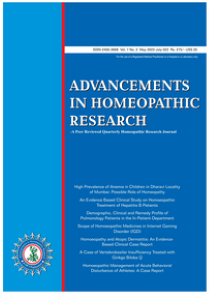Role of Homoeopathy in Treatment of Irritable Bowel Syndrome - A Case Report
DOI:
https://doi.org/10.48165/ahr.2023.8.4.4Keywords:
Irritable Bowel Syndrome, Homeopathy, Gastero intestinal disorders, Rome IV criteriaAbstract
Irritable Bowel Syndrome (IBS) is a recurrent chronic disorder of gasterointestinal system affecting 10-30% of total worldwide population. Women are more affected than men. Homoeopathy is one of the system of medicine which acts on psychosomatic plane of an individual which can bring IBS to complete cure. Homeopathy is the choice of treatment for all psychosomatic disorders especially for IBS. Management of IBS should concentrate on psychological and behavioral interventions along with proper medication. Reducing mental stress, regular exercises, yoga and meditation will give more beneficial in reducing the severity of IBS.
References
Spence DS, Thompson EA. Homeopathic treatment for chronic disease: a 6-year, University-Hospital outpatient observational study. J Altern Complement Med 2005; 11: 793e798.
Mathie RT, Robinson TW. Outcomes from homeopathic prescribing in medical practice: a prospective, research-targeted, pilot study. Homeopathy 2006; 95: 199e205.
Wilson S, Roberts L, Roalfe A, et al.: Prevalence of irritable bowel syndrome: a community survey. Br J Gen Pract 2004, 54:495-502.
Hungin APS, Whorwell PJ, Tack J, et al.: The prevalence, patterns and impact of irritable bowel syndrome: an international study of 40,000 subjects. Aliment PharmacolTher 2003, 17:643-650.
Thompson WG, Heaton KW, Smyth GT, et al.: Irritable bowel syndrome in general practice: prevalence, characteristics, referral. Gut 2000, 46:78-82.
Talley NJ, Gabriel SE, Harmsen WS, et al.: Medical costs in community subjects with irritable bowel syndrome. Gastroenterology 1995, 109:1736-1741.
Lovell RM, Ford AC. Global prevalence of and risk factors for irritable bowel syndrome: a meta analysis. ClinGastroenterolHepatol. 2012;10:712- 21.
Canavan C, West J, Card T. The epidemiology of
irritable bowel syndrome. ClinEpidemiol. 2014;6:71- 80. PMID: 24523597; doi: 10.2147/CLEP.S40245.
Cremonini F, Talley NJ. Irritable bowel syndrome: epidemiology, natural history, health care seeking and emerging risk factors. GastroenterolClin North Am. 2005;34(2):189-204. PMID: 15862929; doi: 10.1016/j. gtc.2005.02.008.
Cash B, Sullivan S, Barghout V: Total costs of IBS: Employer and managed care perspective. Am J Manag Care 2005, 11(1 Suppl):S7-16.
Spiller R, Aziz Q, Creed F, et al. Guidelines on the irritable bowel syndrome: mechanisms and practical management. Gut 2007; 56: 1770e1798.
Ford AC, Lacy BE, Talley NJ. Irritable Bowel Syndrome. N Engl J Med. 2017;376:2566-78.
Cassar GE, Youssef GJ, Knowles S, Moulding R, Austin DW. Health-Related Quality of Life in Irritable Bowel Syndrome: A Systematic Review and Meta analysis. GastroenterolNurs. 2020;43:E102-E22.
Nellesen D, Yee K, Chawla A, Lewis BE, Carson RT. A systematic review of the economic and humanistic burden of illness in irritable bowel syndrome and chronic constipation. J Manag Care Pharm. 2013;19(9):755-64. PMID: 24156644; doi: 10.18553/jmcp.2013.19.9.755.
Zhang F, Xiang W, Li CY, Li SC. Economic burden of irritable bowel syndrome in China. World J Gastroenterol. 2016;22(47):10450-60. PMID: 28058026; doi: 10.3748/wjg.v22.i47.10450.
Canavan C, West J, Card T. Review article: the economic impact of the irritable bowel syndrome. Aliment PharmacolTher. 2014;40(9):1023-34. PMID: 25199904; doi: 10.1111/apt.12938.
Ehlin AGC, Montgomery SM, Ekbom A, et al. Prevalence of gastrointestinal diseases in two British national birth cohorts. Gut 2003; 52: 1117e1121.
Akehurst RL, Brazier JE, Mathers N, et al. Health-
related quality of life and cost impact of irritable bowel syndrome in a UK primary care setting. Pharmacoeconomics 2002; 20: 455e462.
Everhart JE, Ruhl CE. Burden of digestive diseases in the United States part I: overall and upper gastrointestinal diseases. Gastroenterology. 2009;136:376-86.
Ooi AL, Correa D, Pak SC. Probiotics, Prebiotics, and Low FODMAP Diet for Irritable Bowel Syndrome - What Is the Current Evidence? Complement Ther Med. 2019;43:73-80.
Whitehead WE, Palsson O, Jones KR. Systematic review of the comorbidity of irritable bowel syndrome with other disorders: what are the causes and implications? Gastroenterology. 2002;122(4):1140- 56. PMID: 11910364.
Ford AC, Lacy BE, Talley NJ. Irritable Bowel Syndrome. N Engl J Med. 2017;29;376(26):2566-78. PMID: 28657875; doi: 10.1056/NEJMra1607547.
World Gastroenterology Organisation Global Guidelines. Irritable Bowel Syndrome: a Global Perspective. September 2015. [Internet]. [Accessed 2019 August 08]. Available from: https://www.
worldgastroenterology.org/UserFiles/ file/ guidelines/irritable-bowel-syndrome-english-2015. pdf
Ribeiro LM, Alves NG, Silva-Fonseca VA, Nemer ASA. Influence of individual response to stress and psychiatric comorbidity in irritable bowel syndrome. Rev PsiqClín. 2011;38:77-83
Drossman DA, Whitehead WE, Camilleri M. Irritable bowel syndrome: a technical review for practice guideline development. Gastroenterology 1997; 112: 2120e2137.
Peckham EJ, Cooper K, Roberts ER, Agrawal A, Brabyn S, Tew G. Homeopathy for treatment of irritable bowel syndrome. Cochrane Database of Systematic Reviews 2019, Issue 9. Art. No.: CD009710. DOI: 10.1002/14651858.CD009710.
pub3.
Schmulson MJ, Drossman DA. What Is New in Rome IV. J NeurogastroenterolMotil. 2017;23(2):151-63. PMID: 28274109; doi: 10.5056/jnm16214.
Halland M, Saito YA. Irritable bowel syndrome: new and emerging treatments. BMJ. 2015;350:h1622. PMID: 26088265; doi: 10.1136/ bmj.h1622.
Ernst E. Homeopathy, a “helpful placebo” or an unethical intervention? Trends PharmacolSci 2010; 31: 1.
Boericke W, Pocket manual of homoeopathic materia medica and repertory, 2006. B Jain Publishers Pvt Ltd.




